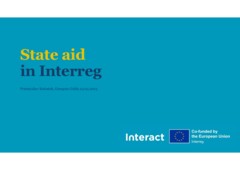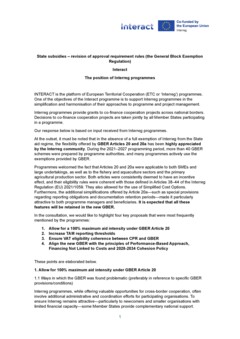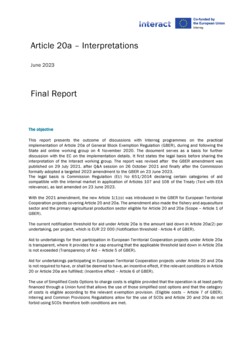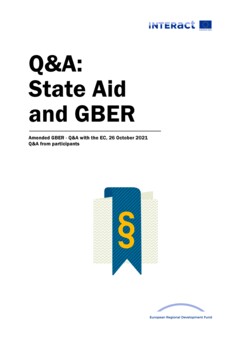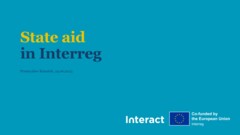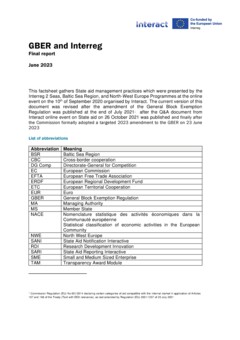State aid
State aid refers to any advantage provided by state resources to undertakings (any entities engaged in economic activities) on a selective basis.
To be State aid, a measure (any form of aid) needs to have all these features:
- there has been an intervention by the State or through State resources which can take a variety of forms (e.g, grants, interest and tax relief, guarantees, government holdings of all or part of a company, or providing goods and services on preferential terms, etc.);
- the intervention gives the recipient an advantage on a selective basis; for example, to specific companies or industry sectors, or to companies located in specific regions;
- competition has been or may be distorted;
- the intervention is likely to affect trade between Member States.
Provision of State aid is generally prohibited in the European Union, but there are some notable exceptions relevant to Interreg which enable programmes to provide funding, but without distorting the Single Market. In the context of Interreg, the most relevant exceptions are contained in the General Block Exemption Regulation and the De minimis Regulation.
General Block Exemption Regulation (GBER)
The GBER specifies permitted categories (block exemptions) of State Aid among which there are two which were designed especially for Interreg programmes:
- Article 20 - Aid for costs incurred by undertakings participating in European Territorial Cooperation project
- Article 20 a - Limited amounts of aid to undertakings for participation in European Territorial Cooperation projects
GBER is officially Commission Regulation (EU) 651/2014 (OJ L 187, 26.06.2014) of 17 June 2014 declaring certain categories of aid compatible with the internal market in application of Articles 107 and 108 of the Treaty Text with EEA relevance (as amended).
Interact actively works to contribute to the review of this regulation, to simplify the rules affecting Interreg.
De minimis Regulation
The De minimis Regulation exempts small aid amounts, thus not meeting all State aid features. It sets a ceiling below which aid is deemed compatible with the Treaty. The current De minimis ceiling is EUR 300 000 granted over a period of three years. As of 2026 it will be obligatory to use either national or Union de minimis registries.
The De minimis Regulation is officially Commission Regulation (EU) 2023/2831 (OJ L, 2023/2831, 15.12.2023) of 13 December 2023 on the application of Articles 107 and 108 of the Treaty on the Functioning of the European Union to de minimis aid.
Where to start
The representations of the State Aid Working Group are useful to understand the wider context of our current work, and they are available below.
What we are working on
A training addressed to beginners covering the notion of State aid, approaches (especially General Block Exemption Regulation and de minimis) to dealing with State aid was held in November 2024. Due to popular demand, it will be repeated later in 2025.
The State aid workshop was organised in 2025 during the InterFIN event. Interact, together with programmes using de minims, also participated in the consulation of the Union de minimis register which will be used as of 2026.
The State aid working group also meet during the year and engage on email as needed to follow developments.
The State aid working group consists of experienced practitioners and programmes who have worked together over several years to follow the GBER consultations and make representations for simplification and harmonisation on behalf of Interreg. Membership of the Working Group, at programme level, is available upon request.
Please note, as this group is long running and following a consultation process, it is not seeking additional members.
Contact
For more information please contact Przemyslaw Kniaziuk.
Want to exchange on this topic?
Interact offers an online space for those working on State aid and with wider Financial programme management to share information and exchange. You can find out more about our MS Teams environment on our Networks page, and see all our networks in our Portal.
If you would like to learn more about this, please contact Przemyslaw Kniaziuk.
Working group
A working group on State aid particularly follows amendments and discussions on GBER and de minimis ais and supports Interreg programmes to advocate for simplification in the rules affecting Interreg.
Relevant outputs and activities
New general de minimis regulation published | 20 December 2023
GBER 2023 Amendment | 26 September 2023




